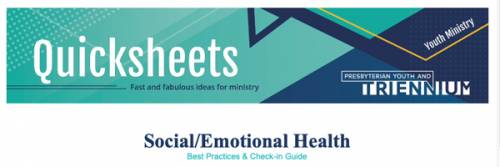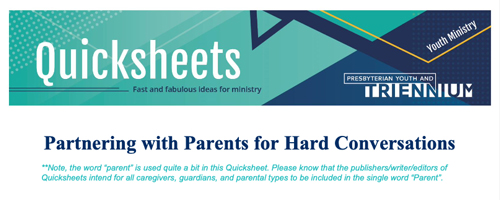Middle school and high school youth are part of Generation Z. They’re more likely than others to report anxiety and other mental health issues
by Paul Seebeck | Presbyterian News Service

Brittany Porch
LOUISVILLE — Two new resources focused on the mental health and wellness of youth are now available for free download from the Office of Presbyterian Youth and Triennium.
The Social/Emotional Health Quicksheet provides a list of check-in questions that can be used in group settings or, say, in a group text check-in to help nurture the mental health of youth. Partnering with Parents for Hard Conversations encourages youth leaders and congregations to equip parents to set aside time to talk to their middle- or high-schooler about what is happening in their world.

Students now in middle school and high school are part of Generation Z. Born between 1997 and 2012 — give or take a few years — they’re described, in the Social/Emotional Health resource, as often “lonely, overwhelmed, feeling unsafe in the world, worriers, and deeply concerned about ethical and humanitarian needs of the world.”
For Gina Yeager-Buckley, associate for Presbyterian Youth and Triennium, talking about mental health, being proactive about providing tools for self-care and modeling mental health are as important and vital to the life and faith of young people as anything else followers of Christ do in the church to serve God faithfully.
“This is part of their lexicon, their language and regular rhythm in many cases. It is where they live, browse and dwell,” she said. “At young ages they understand mental health, mental illness and mental/emotional wholeness. So, we need to be there too, teaching and accompanying them.”

Gina Yeager-Buckley
Yeager-Buckley believes the church must work to understand why Generation Z is reporting more mental health concerns and not dismiss those concerns as a “generational issue.” While she worries about the statistics and the effect the pandemic has had on youth, she also wonders if “the vocal, viral, judgmental and tough world” they’re growing up in is also in some way “strengthening their awareness.” That awareness, she said, can help youth to develop grit, a trait she’s heard from professionals who care for adolescents.
Grateful for the young people in the Presbyterian Church (U.S.A.) and for the youth leaders who work with them, Yeager-Buckley encourages churches to pay attention to their youth — to notice them and to name them.
“Take seriously the gospel to see them,” she said. “Remember how you were seen when young and help young people be a part of your circles of faith, prayer, worship and fellowship, where all ages learn together.”’
And if a youth discloses a behavioral health concern that is serious and potentially harmful or life-threatening, Buckley-Yeager encourages youth leaders to be there for them by helping them enlist the help of a professional.
Brittany Porch, a youth leader, and Sean Delaney, a therapist, teamed up to write Social/Emotional Health, which according to Yeager-Buckley makes it a very relational, practical resource to encourage leaders of youth.

Porch also wrote Partnering with Parents for Hard Conversations, which ties in well with the summer season with its changing schedules, youth away from their studies and family vacations now on the horizon because pandemic restrictions are being lifted in most states. During this time, she said, it can be difficult for parents and guardians to engage in deeply powerful conversations about racism, reconciliation or political and religious tensions.
“This Quicksheet has a beautiful blend of Scripture, theological foundation and developmental awareness,” she said. “All of this feels heavy to parents and adults working with youth. But this helps convey understanding and comfort. After all, most adults are trying to understand their own feelings about how to respond as believers in Jesus Christ to what is happening in our world.”
Social/Emotional Heath and Partnering with Parents for Hard Conversations can be found on the Presbyterian Youth and Triennium webpage. You can find an index to all the Quicksheets offered to youth leaders and congregations here.
![]() You may freely reuse and distribute this article in its entirety for non-commercial purposes in any medium. Please include author attribution, photography credits, and a link to the original article. This work is licensed under a Creative Commons Attribution-NonCommercial-NoDeratives 4.0 International License.
You may freely reuse and distribute this article in its entirety for non-commercial purposes in any medium. Please include author attribution, photography credits, and a link to the original article. This work is licensed under a Creative Commons Attribution-NonCommercial-NoDeratives 4.0 International License.
Categories: Mental Health, Partner Associations, Presbyterian Youth and Triennium, Youth
Tags: brittany porch, christian formation, generation z, gina yeager buckley, high school youth, mental health, middle school youth, office of presbyterian youth and triennium, partnering with parents for hard conversations, Presbyterian Youth and Triennium, quicksheets, Sean Delaney, social/emotional health
Ministries: Youth Ministry, Office of Christian Formation, QuickSheets and Resources, Mental Health Ministry, Partner Associations